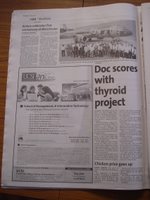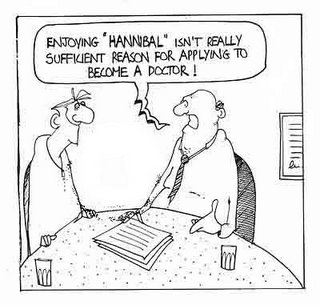It's going to be difficult if/when I decide to go home to practice, seeing the difference in how medicine is practiced. Especially after training and working here for 8 years.
And I'm not even talking about the huge salary difference.
I thought about this yet again when I saw a patient with a pituitary macroadenoma. The pace at which things move here can be dizzying.
Day 1: I see the patient, order lab tests and MRI. Visual field testing.
Day 2: Results show this is nonfunctional. Consult neurosurgery.
Day 4: Neurosurgical consult. Agree to proceed to surgery.
Day 5: Transphenoidal resection of pituitary tumour.
Day 6: Discharged from hospital.
Or, something else I see frequently, primary hyperparathyroidism:
Day 1: See patient for chief complaint of hypercalcemia and high PTH. Order other tests and parathyroid sestamibi.
Day 2: Results suggest an adenoma. Make a surgical referral.
Day 4: Surgeons agree to take patient to surgery.
Day 5: Surgery. Discharged on same day.
Same applies for other fields in medicine. Take an MI (heart attack) for instance. I thought about this when I read about 2 prominent Malaysians who died of 'heart attacks' in the last 2 weeks, and wonder if those could have been saved had those hospitals had the resources:
0 minute: Patient experiences chest pain.
23 minutes: Brought to ER. EKG shows ST segment elevation. Stat labs show elevated cardiac enzymes.
24 minutes: Patient codes from ventricular tachycardia.
24 minutes 15 seconds: Chest pads applied. 200 joules given. Returns to sinus rhythm.
24 minutes 21 seconds: Patient is back from the dead.
31 minutes: Goes to emergency cardiac catheterization.
44 minutes: Coronary stent deployed.
5 days: Patient walks out of the hospital, alive.
I catch myself wondering if I'll be able to switch gears and get used to the system back home. Here, I feel like I'm making a difference, and am truly helping patients. I'm not sure how much I'll be able to do back home. Or, if I'm going to be able to change things for the better.
After all, we physicians do get so spoilt here. Order a chest CT, and within 4 hours I'm seeing the report and the images on the computer.
I know doctors back home do the best they can, and often patients do receive excellent care. But I do wish there was more funding for public healthcare.
 It's funny how things happen when you least expect it. It's also interesting how sometimes things can go so well when you throw caution to the wind and break all the rules and norms of dating.
It's funny how things happen when you least expect it. It's also interesting how sometimes things can go so well when you throw caution to the wind and break all the rules and norms of dating.






